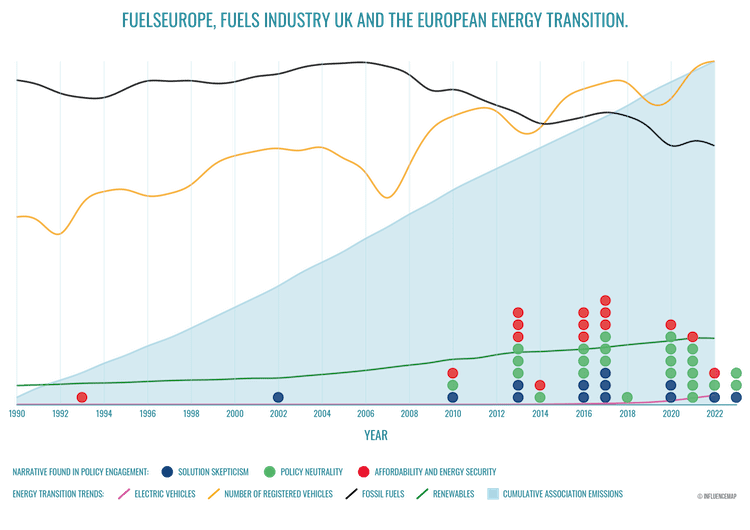The European Union’s climate-change monitoring service named June 2024 the ‘hottest June on record’ and the 13th consecutive month of record-breaking heat. This is just another in a long series of data points which definitively show we are witnessing a severe and sustained change in the world’s climate.
This will not be a surprise to its largest oil and gas companies. In April a hearing by the Committee on the Budget of the United States Senate, on ‘Denial, doublespeak and disinformation’ from ‘Big Oil’—and the accompanying report—laid out more clearly than ever how much these companies knew of, yet continued to ‘obscure’, ‘the actual dangers of fossil fuels’.
Misleading narratives
A group that has continued to escape such scrutiny comprises the fossil-fuel industry associations—coalitions of the most well-known energy companies which claim to ‘represent the interests of the industry’ to policy-makers and governments behind the scenes. New research by the London-based climate think-tank InfluenceMap found this group had used its power for decades to embed misleading narratives opposed to the climate transition at the heart of policy-making.
In the EU, the largest of these associations is FuelsEurope. Its membership includes the giants ExxonMobil, TotalEnergies, Shell, BP and Repsol. The last three value this relationship so highly they have company directors on the FuelsEurope board to maximise oversight of its strategic direction. The US and British equivalents, the American Petroleum Intitute (API) and Fuels Industry UK, have overlapping membership and similarly advocate, across jurisdictions, in favour of the fossil-fuel value chain.
The research analysed a tranche of newly discovered evidence of lobbying by these three groups against renewables and electric vehicles over the last 50 years. This suggests that the API developed three separate arguments in the 1960s to safeguard fossil fuels in perpetuity. Its European counterparts had taken up this ‘playbook’ at least by the 1990s—although, given the narratives’ ubiquity in documents and reports, probably much earlier.
Three arguments
The three arguments, elaborated below, can be encapsulated as ‘policy neutrality’, ‘solution scepticism’ and ‘affordability and security’. Their deployment has contradicted science-based policy recommendations by the Intergovernmental Panel on Climate Change (IPCC) and the International Energy Agency (IEA).
The evidence led InfluenceMap to conclude that consistent use of these narratives over decades had likely succeeded in delaying the energy transition. They continue to pose a serious threat to policy progress in the EU and internationally. (See the infographic below combining their use in policy engagement with trends in the energy transition in Europe.)
In the EU context, progress has undoubtedly slowed as a result of negative lobbying on climate policy. In June 2023, Climate Action Tracker designated the union’s current efforts to hit internationally agreed climate targets as ‘insufficient’. As recently as 2021, the IEA showed that electric vehicles constituted less than 2 per cent of all registered vehicles in the EU.

Rehearsed by legislators
The ‘policy neutrality’ argument is disproportionately favoured by European industry associations—they were found to have used it 85 per cent of the time when lobbying against climate policies. In this vein they have sought to resist or dilute ‘technology specific’ policy that supports solely zero-carbon solutions, instead favouring inclusion of ‘transition technology’ or ‘low-carbon fuel’. This allows industry associations to avoid opposing renewables and EVs outright, but still leaves a place for fossil fuels in legislation.
As FuelsEurope put it in 2022, ‘we strongly believe that the decarbonisation of transport should be technology neutral and holistic’. During the last EU legislative cycle, InfluenceMap detected this narrative used across sectors, on issues as diverse as energy taxation, hydrogen, the phase-out of the internal-combustion engine and transition to sustainable food systems. At times, it was even rehearsed by legislators, suggesting direct influence on EU institutions.
Although FuelsEurope and Fuels Industry UK claim to support European climate goals and targets, arguing for a ‘policy neutral’ approach is counter to what scientists have asserted. The IPCC explicitly credits the disparaged ‘technology specific’ policy with having ‘led to a greater use of less carbon intensive and less energy intensive technologies’—indeed it attributes the global uptake of renewable-energy sources largely to it. Besides, demanding ‘neutral’ policy within a regulatory and economic landscape geared towards an energy system reliant on fossil fuels is arguably highly disingenuous.
Directly contradicting
‘Solution scepticism’ is used to undermine the viability of alternative energy sources. For example, it is claimed that EVs are unnecessary or infeasible or that, anyway, future technologies will negate the need for an energy transition. This directly contradicts the IPCC’s Sixth Assessment Report, which underscores the viability and necessity of the transition from fossil fuels to renewables and affirms that electrification of light-duty transport has the highest decarbonisation potential, compared with other options.
The final narrative, ‘affordability and energy security’, places fossil fuels at the centre of cost and security concerns and frames any move to reduce their use as an existential risk. It is an argument which, paradoxically, becomes more effective as global heating destabilises communities.
In 2022 FuelsEurope, commenting on the directive on the energy performance of buildings—then under revision—said that exclusion of fossil-fuel heating systems ‘could lead to the disproportionate and discriminatory ban of low-carbon and renewable fuel technologies, predominately used in low income households and/or off-grid communities’. The IPCC’s recent reports however emphasise that renewables can now compete without financial support and are often cheaper than fossil fuels in various regions, so are ‘crucial’ for enhancing access and security.
Sowing doubt, stoking fear
By following this playbook, the oil-and-gas industry associations have sown doubt among policy-makers, over the viability of solutions and the need for zero-carbon technologies, while stoking fear about the implications of the energy transition from fossil fuels. Meanwhile, their individual corporate members, particularly in Europe, have been able publicly to support policy on technologies such as carbon capture and storage, hydrogen and EVs while simultaneously advocating expansion of fossil fuels behind the scenes, funding these associations to the tune of hundreds of millions of dollars. This corporate ‘doublespeak’ enables the fossil-fuel lobby to undermine climate progress.
Addressing the United Nations last month, the secretary-general, António Guterres, issued a clear instruction: ‘We must directly confront those in the fossil fuel industry who have shown relentless zeal for obstructing progress—over decades.’ The evidence in our report reveals the means by which this zeal has been channelled into action.
Not only must we dispute these narratives when they appear in corporate promotion—as Guterres urged. We must also ensure policy-makers are vigilant and informed, able to identify and call out the outdated and misleading arguments that are compromising effective climate policy and jeopardising the realisation of climate goals.
Tom Holen is a programme manager at InfluenceMap, leading its work on the energy transition. His focus is on corporate advocacy from the oil and gas sector on related policies, such as on decarbonisation and hydrogen.

